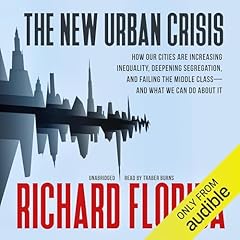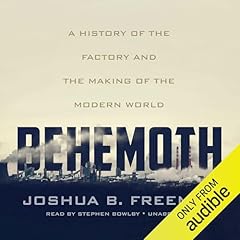
Henry Ford’s Plan for the American Suburb: Dearborn and Detroit
No se pudo agregar al carrito
Add to Cart failed.
Error al Agregar a Lista de Deseos.
Error al eliminar de la lista de deseos.
Error al añadir a tu biblioteca
Error al seguir el podcast
Error al dejar de seguir el podcast
 Exclusivo para miembros Prime: ¿Nuevo en Audible? Obtén 2 audiolibros gratis con tu prueba.
Exclusivo para miembros Prime: ¿Nuevo en Audible? Obtén 2 audiolibros gratis con tu prueba.Compra ahora por $17.33
-
Narrado por:
-
David Stickney
-
De:
-
Heather Barrow
Around Detroit, suburbanization was led by Henry Ford, who not only located a massive factory over the city's border in Dearborn but also was the first industrialist to make the automobile a mass consumer item. So, suburbanization in the 1920s was spurred simultaneously by the migration of the automobile industry and the mobility of automobile users.
A welfare capitalist, Ford was a leader on many fronts - he raised wages, increased leisure time, and transformed workers into consumers, and he was the most effective at making suburbs an intrinsic part of American life. The decade was dominated by this new political economy - also known as "Fordism" - linking mass production and consumption. The rise of Dearborn demonstrated that Fordism was connected to mass suburbanization as well. Ultimately, Dearborn proved to be a model that was repeated throughout the nation, as people of all classes relocated to suburbs, shifting away from central cities.
Mass suburbanization was a national phenomenon. Yet the example of Detroit is an important baseline since the trend was more discernable there than elsewhere. Suburbanization, however, was never a simple matter of outlying communities growing in parallel with cities. Instead, resources were diverted from central cities as they were transferred to the suburbs. The example of the Detroit metropolis asks whether the mass suburbanization which originated there represented the "American dream", and if so, by whom and at what cost.
The audiobook is published by University Press Audiobooks.
©2015 Northern Illinois University Press (P)2020 Redwood AudiobooksLos oyentes también disfrutaron:




















Reseñas de la Crítica
"An original and significant piece of scholarship...engaging and informative." (John McCarthy, author of Making Milwaukee Mightier)
This book was a joy in that it touches on a more external aspect of the Man and Machine that was Ford. How the world was changed may be well known at a general level, but this book gives specific down to earth details on the immediate impact on the environs of Detroit which I, as the son of a land developer, can really relate to. I have only just started, but the details of the social and economic impact of the area surrounding the Ford business operations is fascinating to me. I am looking forward to finishing this as it is pulling together the details of my most persistent hobby in a meaningful way.
If it wasn't by the automobile, it would have been something or someone else that changed the world so fundamentally during the 1900's. Undoubtedly something like the computer had the same effect and its own history, but this one about the automobile is mine and my generation.
Great listen on many levels.
Se ha producido un error. Vuelve a intentarlo dentro de unos minutos.


